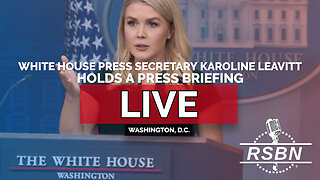Premium Only Content

Petro Vanishes at Caribbean Summit: A Crisis of State
In a scandal that has shaken Latin America and raised alarms in democratic nations across the hemisphere, Colombian President Gustavo Petro has once again disappeared during a high-level diplomatic event, offering no credible explanation to attending heads of state and plunging his country into a crisis of representation and international credibility. This situation has gone beyond politics—it is institutional, diplomatic, and deeply offensive.
What happened in Montería—where Petro arbitrarily moved the site of the Caribbean leadership summit from the historic city of Cartagena de Indias—revealed an alarming pattern of erratic behavior. This time, however, the irresponsibility wasn’t just political: it was a full-blown diplomatic failure. The President of Panama, who was set to receive the pro tempore presidency of the regional organization from Petro, was left publicly disrespected by the host’s inexplicable absence. Also in attendance were representatives from Haiti, the Dominican Republic, Barbados, and Jamaica—all left in the dark by a president who vanished without notice or protocol.
An Unprecedented Disappearance
While the invited presidents waited for the protocol ceremony to begin, President Petro simply failed to appear. No call, no official message, not even a formal excuse issued by Colombia’s Ministry of Foreign Affairs. What started as confusion quickly turned to disbelief, and ultimately, to diplomatic outrage.
Hours later, Petro resurfaced with an implausible and deeply offensive excuse, claiming he had been the target of an assassination attempt and needed to go into hiding for his safety. According to his account, threats were allegedly made by drug trafficking organizations based in Abu Dhabi—a claim that, besides sounding absurd, redirected attention to a narrative he has used repeatedly: persecution.
But the reality that many in Colombia—including members of Petro’s inner circle—can no longer hide is much more serious: the president is suffering from an addiction, possibly to alcohol or drugs. Recent comments by former Foreign Minister Álvaro Leyva, who hinted that Petro’s absence wasn’t “just for a coffee break,” confirm what’s been whispered in Bogotá for months.
An Addiction That Crosses Borders
This issue is not just domestic. Petro is actively damaging Colombia’s international image—a country that has spent decades trying to shed the stigma of narcotrafficking and political corruption. With every new disappearance, his presidency becomes a regional tragicomedy that undermines Latin American integration efforts and destabilizes multilateral agendas. What kind of diplomatic commitment can be expected from a president who vanishes without warning from a summit in his own country?
This behavior is not an isolated incident. On multiple occasions during his presidency, Petro has abruptly left official events, arrived late or visibly altered to government meetings, and canceled international trips without clear justification. In any country with strong institutions, these actions would prompt a formal medical evaluation—or even removal from office on grounds of incapacity.
The Complicit Silence
Perhaps more alarming than the president’s behavior is the deafening silence from those around him. The Presidential Palace, the Foreign Ministry, Congress, and even some media outlets aligned with the government have remained willfully silent in the face of what is clearly an institutional emergency.
Where are the oversight mechanisms? Where is Colombia’s Congressional Accusations Committee? Why hasn’t the Colombian opposition—so vocal on social media—demanded a serious medical evaluation of the head of state? Can a country’s governance truly depend on whether its president is sober or not?
Worse still, what assurance do international allies have that agreements with Colombia will be honored when its president can vanish at any moment due to a “health issue” or alleged “threat”? Colombia’s credibility is on the line.
Normalizing the Unacceptable
Imagine if the President of the United States—Republican or Democrat—disappeared from an international summit hosted on American soil and reemerged spouting conspiracy theories, without any consequences. Why, then, is this tolerated in Colombia?
Democracy cannot allow the normalization of irresponsibility. Addiction is a disease, and no one is questioning President Petro’s right to seek treatment. But one cannot lead a nation while suffering from an untreated, undisclosed addiction—especially one covered up with official lies.
The presidency is not a personal privilege—it is a responsibility to 50 million Colombians and to the international community. Petro is not fit to serve, and his continued presence in office threatens both Colombia’s stability and regional security.
A Warning for the United States
For Washington, this episode serves as a stark warning. The U.S.-Colombia relationship—one of the most strategic in Latin America—can no longer be guided by leftist romanticism or blind faith in Petro’s rhetoric of “total peace,” which has yielded few tangible results. Petro is not a reliable partner, and U.S. foreign policy must prepare for scenarios of instability—including a potential power vacuum in Bogotá.
Republican leadership in the Senate and House should consider the ramifications of this crisis on key issues such as counternarcotics cooperation, border security investments, and regional surveillance of armed groups and terrorist cells that may take advantage of Colombia’s internal chaos.
Time to Speak the Truth
Petro does not need more time. He does not need more excuses. He needs to face the truth. And if he refuses to do so, the Colombian people—and the international community—must demand it.
Democracy requires transparency, coherence, and responsibility. And none of those values can flourish under a president who is absent, addicted, or mentally unstable.
The question isn’t whether Petro should come clean—the question is why the mechanisms for his removal haven’t already been activated.
-
 2:06:37
2:06:37
Steven Crowder
4 hours agoJasmine Crockett's Epstein Idiocy & the Absolute State of the Democrat Party
401K250 -
 LIVE
LIVE
Sean Unpaved
2 hours agoAre Josh Allen & Bills On UPSET ALERT vs. Texans? | UNPAVED
100 watching -
 LIVE
LIVE
Side Scrollers Podcast
3 hours agoRoblox Kids TRANS Game + Pokimane ROASTED AGAIN + More | Side Scrollers
653 watching -

The Charlie Kirk Show
2 hours agoTP Action Update + Mogadishu Minnesota + Replacing ObamaCare | Bowyer, Thorpe, Cremieux | 11.20.2025
29.3K6 -

Right Side Broadcasting Network
4 hours agoLIVE: White House Press Secretary Karoline Leavitt Holds a Press Briefing - 11/20/25
29.8K9 -
 LIVE
LIVE
Rebel News
1 hour agoCBSA refugee revelation, No oil tankers in BC, Notwithstanding clause debate | Rebel Roundup
324 watching -
 LIVE
LIVE
TheAlecLaceShow
2 hours agoGuests: Scott Jennings, Senator Marsha Blackburn, Del Bigtree | The Alec Lace Show
59 watching -
 1:01:04
1:01:04
The Rubin Report
3 hours agoThe Exact Moment CNN Host Realizes Jasmine Crockett Is a Monster
30.5K68 -
 LIVE
LIVE
LFA TV
16 hours agoLIVE & BREAKING NEWS! | THURSDAY 11/20/25
2,202 watching -
 1:02:09
1:02:09
VINCE
5 hours agoThe Process Is The Punishment | Episode 173 - 11/20/25 VINCE
209K173